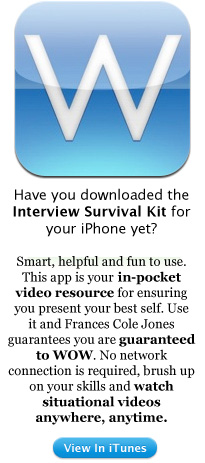Originally published on San Francisco Employment Jobs Careers:
 Even in a world of gee-whiz technology, some old-fashioned ideals — like manners — aren’t outmoded. Business etiquette in general, and netiquette in particular, are crucially important to your career. Why? Because in an intensely competitive job market and with all other factors being equal, the candidate with better conduct is more likely to get the offer.
Even in a world of gee-whiz technology, some old-fashioned ideals — like manners — aren’t outmoded. Business etiquette in general, and netiquette in particular, are crucially important to your career. Why? Because in an intensely competitive job market and with all other factors being equal, the candidate with better conduct is more likely to get the offer.
“Recruiters and companies presume competence based upon observable behaviors,” says Jodi R. R. Smith, founder of Mannersmith Etiquette Consulting in Marblehead, Massachusetts. If you don’t exhibit them, employers may take you out of the running, she says.
Here are some can’t-miss tips for exercising good etiquette during your job search.
Mail/Email Etiquette
Be professional when writing to a potential employer — even if the person is your age. “The biggest faux pas is the assumed colloquial, familiar nature of communication,” says Carolina Ceniza-Levine, a partner with SixFigureStart, a career coaching firm in New York City.
Spelling any name incorrectly or calling a Ms. a Mr. can be the kiss of death. “Double- and triple-check it if you have to,” says Mandy Boyle, who manages the social media presence for Solid Cactus, an e-commerce solutions provider in Shavertown, Pennsylvania. “Don’t let your email, CV or referral slip through the cracks because you didn’t take the time.”
Since manners are about helping people feel comfortable, skip the pithy close or potentially controversial quote in your email signature. Ditto the zany email address. “HotMama69@whatever.com is not going to impress,” say Kate Tykocki, chief communications officer of Capital Area Michigan Works!, a One-Stop career center in Lansing, Michigan. “It’s going to create a perception that you haven’t thought your job search through or that you just don’t care.”
Telephone Etiquette
It’s equally important to be mannerly on the phone. Mind your vmail greeting. “I’m out partying. Leave a message and I might call you back when I’m not wasted” may work for your buddies, but it’s not going to work for a potential employer. Record a message that gives your name, number and instructions on leaving a message, or other modes of contact.
When you’re the one calling, be brief and professional. Robin Reshwan, founder of Collegial Staffing, a career-preparation consulting company based in Alamo, California, suggests this process:
- Write down key points.
- Make sure the most important information is at the top.
- Practice to get a smooth flow.
- Time it. A message more than 10 to 15 seconds is too long.
- Make the call.
“Follow instructions on the recording,” notes Dave Clarke, communications strategist with Churnless, a New York City-based digital strategy and production company. “If the person asks for name, number and a brief message, do that and no more.” That’s an easy way to show you listen and follow directions.
Social Media Netiquette
“Your digital persona can say a lot about how you conduct yourself in real life,” Tykocki says. If you come off as negative based on a perusal of your Facebook page, tweets or LinkedIn activity, you may inadvertently turn off an employer who doesn’t want “that sort of personality in their workforce,” she says.
Think about your Facebook, Twitter and other social media use this way: “If you were asked to open any of these sites during an interview, would you still get the job after the HR director looked at them?” asks Frances Cole Jones, author of The Wow Factor: The 33 Things You Must (and Must Not) Do to Guarantee Your Edge in Today’s Business World. If the answer is no, clean up your act.
To avoid other netiquette errors, remember to keep the social graces in mind when using social media.
Using the maximum privacy setting is good, but not foolproof. So scrape offensive language and images from your pages and tweets to avoid turning off employers. And mind your posts going forward to avoid breeches of good taste. “Give before asking,” says Arden Clise, a Seattle-based business etiquette consultant.
“Give recommendations [on LinkedIn], comment on people’s posts, retweet people’s tweets, make introductions, send relevant articles to your contacts, etc.” Similarly, show interest in the person. “I’ve had contacts who I haven’t heard from in years request a recommendation or introduction and not ask about me or show any interest in what I’m doing,” she says. They usually don’t get what they’re asking for, she adds.
Additionally, respect people’s time by keeping your posts and tweets high value and low volume. “Notifications are instantaneous and most people check Twitter, Facebook, etc. at least a few times a day,” Clarke says. “When I see that a potential job seeker has @ replied to me 10 times in a day about nothing important [or] valuable, I’m turned off.”
While these business etiquette guidelines seem like common sense, a dizzying number of job seekers don’t follow them. To make it easier for you, Clarke boils it down to its essence: “Don’t be an idiot. If you wouldn’t want your mom to read something you posted, don’t do it.”
 Have you ever found yourself in the middle of a business negotiation, and suddenly realized that a new element has been – sometimes delicately, sometimes not—added to the mix? And that that element is no less than– surprise– you?
Have you ever found yourself in the middle of a business negotiation, and suddenly realized that a new element has been – sometimes delicately, sometimes not—added to the mix? And that that element is no less than– surprise– you?


























